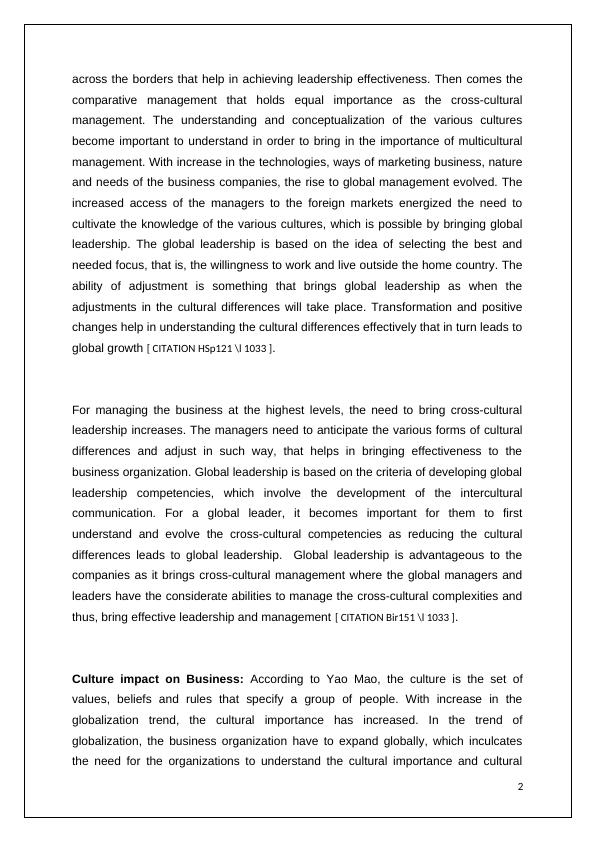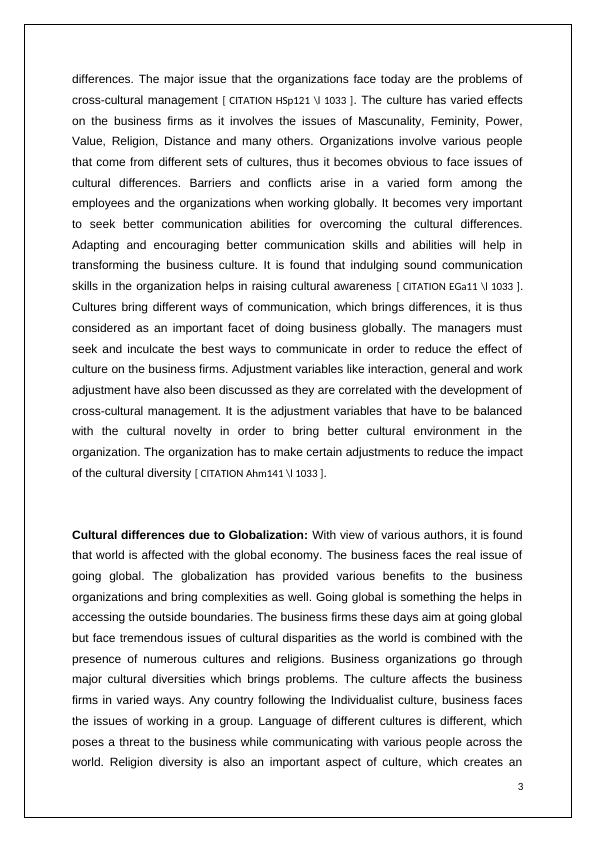Introduction: Cross Culture Management
Added on 2021-06-16
7 Pages2596 Words53 Views
Introduction: This academic essay is prepared to enlist the notion of culture in thebusiness world. The study is based on the literature review that outlines the viewsand perceptions of the various researchers and authors on the specific topic ofculture and business. Few journals and articles are deeply studied that are directly orindirectly related to this topic in order to form the basis for the study. Cross Cultural management to Global leadership: In the view of the Allan Birdand Mark in their article, it is stated that every business faces the need to expandtheir cultural boundaries. The organization the face cross-cultural managementissues while interacting with people from different cultures. Cultures are the integralpart of the business sector. Managing cultures are the most significant part as thebusinesses have now expanded and involve the management of the cross-cultures.Cross-cultural management is exactly the management or adjustment of thecultures, when the business operates in different countries with the different people.The evolution of cross-cultural management took place from the beginning whenother fields of management were evolved. Ever since then, the cross-culturalconcept has evolved, but it did not come up more like any other field of managementdue to lack of study in this particular field. But, this field holds an equal and importantplace in the business world as it has it has own importance and need. Implicit focuswas put by the researchers and managers in the earlier times, when Americancompanies tried to expand their business in the foreign markets and faced the issuesof cultural differences. Cross-cultural management was considered as the part of theorganizational behaviour. Many organizations faced problems and lack thecompetency to understand the main reason of facing the issues while expanding inthe foreign markets. In 1990s, the organizations went to a shift that gave rise to thecultural importance. The change in the organizational structure of the organizations,where the managers loosened the control and upgraded the importance of sharedvalue that is when a rise in the cultural awareness was anticipated. This further leadsto the development of the global leadership. With rise to cultural awareness, theorganizations now have their focus on global achievement, which is possible only bycross-cultural management. Cross-cultural management brings Unicultural segmentto the studies. The Unicultural focus becomes important as managers workingoutside the home country feel the need to gain knowledge regarding the cultures1

across the borders that help in achieving leadership effectiveness. Then comes thecomparative management that holds equal importance as the cross-culturalmanagement. The understanding and conceptualization of the various culturesbecome important to understand in order to bring in the importance of multiculturalmanagement. With increase in the technologies, ways of marketing business, natureand needs of the business companies, the rise to global management evolved. Theincreased access of the managers to the foreign markets energized the need tocultivate the knowledge of the various cultures, which is possible by bringing globalleadership. The global leadership is based on the idea of selecting the best andneeded focus, that is, the willingness to work and live outside the home country. Theability of adjustment is something that brings global leadership as when theadjustments in the cultural differences will take place. Transformation and positivechanges help in understanding the cultural differences effectively that in turn leads toglobal growth [ CITATION HSp121 \l 1033 ].For managing the business at the highest levels, the need to bring cross-culturalleadership increases. The managers need to anticipate the various forms of culturaldifferences and adjust in such way, that helps in bringing effectiveness to thebusiness organization. Global leadership is based on the criteria of developing globalleadership competencies, which involve the development of the interculturalcommunication. For a global leader, it becomes important for them to firstunderstand and evolve the cross-cultural competencies as reducing the culturaldifferences leads to global leadership. Global leadership is advantageous to thecompanies as it brings cross-cultural management where the global managers andleaders have the considerate abilities to manage the cross-cultural complexities andthus, bring effective leadership and management [ CITATION Bir151 \l 1033 ]. Culture impact on Business: According to Yao Mao, the culture is the set ofvalues, beliefs and rules that specify a group of people. With increase in theglobalization trend, the cultural importance has increased. In the trend ofglobalization, the business organization have to expand globally, which inculcatesthe need for the organizations to understand the cultural importance and cultural2

differences. The major issue that the organizations face today are the problems ofcross-cultural management [ CITATION HSp121 \l 1033 ]. The culture has varied effectson the business firms as it involves the issues of Mascunality, Feminity, Power,Value, Religion, Distance and many others. Organizations involve various peoplethat come from different sets of cultures, thus it becomes obvious to face issues ofcultural differences. Barriers and conflicts arise in a varied form among theemployees and the organizations when working globally. It becomes very importantto seek better communication abilities for overcoming the cultural differences.Adapting and encouraging better communication skills and abilities will help intransforming the business culture. It is found that indulging sound communicationskills in the organization helps in raising cultural awareness [ CITATION EGa11 \l 1033 ].Cultures bring different ways of communication, which brings differences, it is thusconsidered as an important facet of doing business globally. The managers mustseek and inculcate the best ways to communicate in order to reduce the effect ofculture on the business firms. Adjustment variables like interaction, general and workadjustment have also been discussed as they are correlated with the development ofcross-cultural management. It is the adjustment variables that have to be balancedwith the cultural novelty in order to bring better cultural environment in theorganization. The organization has to make certain adjustments to reduce the impactof the cultural diversity [ CITATION Ahm141 \l 1033 ].Cultural differences due to Globalization: With view of various authors, it is foundthat world is affected with the global economy. The business faces the real issue ofgoing global. The globalization has provided various benefits to the businessorganizations and bring complexities as well. Going global is something the helps inaccessing the outside boundaries. The business firms these days aim at going globalbut face tremendous issues of cultural disparities as the world is combined with thepresence of numerous cultures and religions. Business organizations go throughmajor cultural diversities which brings problems. The culture affects the businessfirms in varied ways. Any country following the Individualist culture, business facesthe issues of working in a group. Language of different cultures is different, whichposes a threat to the business while communicating with various people across theworld. Religion diversity is also an important aspect of culture, which creates an3

End of preview
Want to access all the pages? Upload your documents or become a member.
Related Documents
Cross-Cultural Management to Global Leadershiplg...
|11
|2940
|87
Global Leadership and Cross-Cultural Managementlg...
|8
|2437
|322
Cross cultural Management and Communication Reportlg...
|10
|2684
|79
Cross-Cultural Management: Evolution, Categories, and Importancelg...
|12
|917
|478
Business Ethics in Global Perspectivelg...
|12
|3110
|276
Cross Cultural Management - Assignmentlg...
|8
|2743
|64
